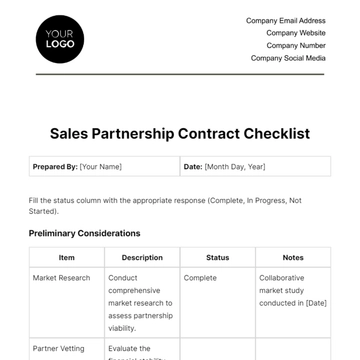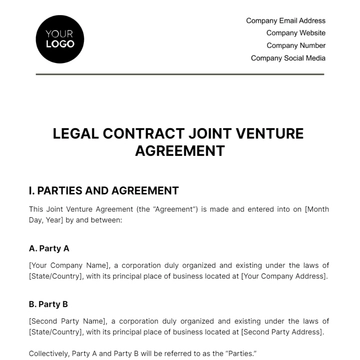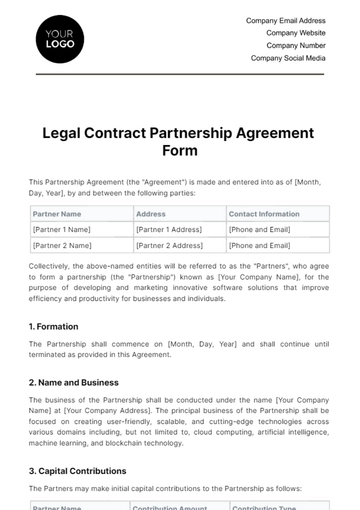Free Travel Agency Partnership Contract

I. The Parties
This Partnership Contract ("Contract") is entered into on [Month Day, Year] ("Effective Date"), by and between [Your Company Name], a company incorporated and existing under the laws of [State Name] with its principal office located at [Your Company Address] ("First Party"), and [Second Party Name], a company incorporated and existing under the laws of [State Name] with its principal office located at [Second Party Address] ("Second Party"), collectively referred to as the ("Parties") or individually as a ("Party").
WHEREAS, First Party operates as a travel agency and wishes to expand its market presence and capabilities through collaborative partnerships;
WHEREAS, Second Party possesses expertise and resources in the travel industry, which can be beneficial to First Party in achieving its business objectives;
WHEREAS, the Parties wish to establish a partnership as defined under the terms and conditions herein for the mutual benefit of both parties;
NOW, THEREFORE, in consideration of the mutual covenants and promises herein contained, the Parties hereto agree as follows:
II. Purpose
The purpose of this Contract is to define the terms and conditions under which the Parties will collaborate to enhance travel services and products offered to their respective customers by leveraging each other’s resources, expertise, and market reach.
A. Enhancement of Services
Collaborative Effort: The Parties aim to work together to improve the quality and range of travel services offered to their customers. This includes exploring new markets, developing innovative products, and enhancing customer service.
Resource Sharing: By sharing resources and expertise, the Parties can achieve greater efficiency and effectiveness in their operations, leading to cost savings and improved customer satisfaction.
Market Expansion: Through this partnership, the Parties hope to expand their market presence, reaching new customers and serving existing customers better.
B. Mutual Benefit
Shared Success: The Parties enter into this partnership with the understanding that their success is interconnected. They commit to working together in a way that benefits both Parties and leads to shared success.
Leveraging Strengths: Each Party brings unique strengths to this partnership. By leveraging these strengths, the Parties can create a synergy that results in greater success than they could achieve individually.
Long-term Relationship: The Parties view this partnership as a long-term relationship. They are committed to investing in the partnership and working together to overcome any challenges that arise.
III. Scope of Partnership
The partnership will involve the following key activities:
A. Joint Marketing Initiatives
Coordinated Campaigns: The Parties will coordinate their marketing efforts to promote their joint services. This could include joint advertising campaigns, social media promotions, and special events.
Shared Marketing Resources: The Parties will share marketing resources, such as customer databases, market research, and marketing expertise, to enhance their joint marketing initiatives.
Brand Alignment: The Parties will ensure that their joint marketing initiatives align with both Parties’ brand identities and values.
B. Co-branding Opportunities
Joint Products: The Parties will explore opportunities to develop joint products or services that can be co-branded. This could include joint travel packages, co-branded marketing materials, or joint customer loyalty programs.
Brand Exposure: Co-branding can increase brand exposure and recognition for both Parties, reaching new audiences and strengthening their brand identities.
Quality Assurance: The Parties will ensure that all co-branded products or services meet the high standards of quality that their customers expect.
C. Shared Technology Platforms
Technology Integration: The Parties will explore opportunities to integrate their technology platforms to enhance their joint services. This could include shared booking systems, integrated customer relationship management systems, or joint data analysis tools.
Efficiency and Convenience: Shared technology platforms can increase efficiency and convenience for both the Parties and their customers. They can streamline operations, improve customer service, and provide valuable insights into customer behavior.
Data Security: The Parties will ensure that all shared technology platforms comply with data protection laws and best practices for data security.
D. Cross-selling of Travel Packages
Expanded Offerings: The Parties will cross-sell each other’s travel packages, providing their customers with a wider range of travel options. This can enhance customer satisfaction and increase sales for both Parties.
Customer Convenience: Cross-selling can provide greater convenience for customers, allowing them to access a wider range of services from a single source. It can also provide opportunities for package deals or discounts that provide added value for customers.
Revenue Sharing: The Parties will agree on a fair and equitable method for sharing the revenue from cross-sold travel packages. This will be outlined in more detail in the financial terms of the Contract.
E. Resource Sharing for Operational Efficiency
Shared Resources: The Parties will share resources where feasible to increase operational efficiency. This could include sharing office space, equipment, or administrative services.
Cost Savings: Resource sharing can lead to significant cost savings for both Parties, allowing them to operate more efficiently and competitively.
Collaborative Culture: Sharing resources can also foster a culture of collaboration and teamwork, strengthening the partnership and leading to better outcomes for both Parties.
IV. Financial Contributions
The Parties agree to provide the following financial contributions to the joint venture:
A. First Party’s Contribution
Initial Contribution: The First Party agrees to provide an initial contribution covering [50]% of the startup costs. This includes costs related to setting up the partnership, initial marketing efforts, and other upfront expenses.
Ongoing Costs: In addition to the initial contribution, the First Party will cover [50]% of ongoing costs. These costs include operational expenses, marketing costs, and other expenses necessary for the continued operation of the joint venture.
B. Second Party’s Contribution
Initial Contribution: The Second Party will also provide an initial contribution covering [50]% of the startup costs. This ensures that both Parties share equally in the risk and potential rewards of the joint venture.
Ongoing Costs: The Second Party will cover [50]% of ongoing costs. This commitment ensures that both Parties contribute equally to the success of the joint venture.
V. Revenue Sharing
The revenue generated from the joint partnership will be distributed as follows:
A. First Party’s Share
Share of Net Revenues: The First Party will receive [50]% of net revenues generated by the joint venture. Net revenues are calculated as total revenues minus any costs or expenses.
Payment Schedule: The First Party’s share of net revenues will be paid on a regular basis, for example, quarterly or annually. The exact payment schedule will be agreed upon by both Parties.
B. Second Party’s Share
Share of Net Revenues: The Second Party will receive [50]% of net revenues. This ensures that the rewards of the joint venture are shared equally between the Parties.
Payment Schedule: The Second Party’s share of net revenues will also be paid on a regular basis, with the exact schedule to be agreed upon by both Parties.
C. Financial Transparency
Financial Records: Both Parties agree to maintain accurate and complete financial records for the joint venture. These records will be available for inspection by either Party upon request.
Financial Audits: The Parties agree to conduct regular financial audits to ensure the accuracy of the financial records and the fairness of the revenue sharing. The audits will be conducted by a mutually agreed upon third-party auditor.
Dispute Resolution: In case of any disputes over financial contributions or revenue sharing, the Parties agree to resolve the dispute through negotiation or mediation before resorting to legal action.
VI. Responsibilities of the Parties
A. First Party
The First Party shall:
Travel Packages: Provide a variety of travel packages that cater to different customer preferences. These packages should be comprehensive, including details about the itinerary, accommodations, transportation, and other related services.
Service Provider Relationships: Manage relationships with service providers like hotels and airlines. This includes negotiating contracts, ensuring quality of service, and resolving any issues that may arise.
Technology Support: Assist in providing technology support and resources. This could include maintaining the online booking system, ensuring the security of customer data, and troubleshooting technical issues.
B. Second Party
The Second Party shall:
Customer Interfaces: Manage customer interfaces and booking systems. This includes maintaining the user interface of the booking platform, ensuring it is user-friendly and up-to-date.
Marketing Materials: Provide marketing and promotional materials. This includes creating engaging content to attract customers, such as blog posts, social media posts, and email newsletters.
Customer Service: Handle customer service and support. This includes responding to customer inquiries, resolving complaints, and providing assistance during the booking process.
VII. Term and Termination
A. Contract Term
Commencement: This Contract shall commence on the Effective Date, which is the date when both Parties have signed the Contract. From this date, all terms and conditions of the Contract will be in effect.
Duration: The Contract shall continue in effect until [Month Day, Year], providing a long-term framework for the partnership between the Parties. This allows for continuity and stability in the joint venture operations.
B. Termination Notice
Notice Requirement: Either Party may terminate this Contract upon [30] days’ written notice to the other Party. This gives both Parties sufficient time to wind down joint venture activities in an orderly manner.
Content of Notice: The termination notice should specify the intended termination date and the reason for termination. It should be delivered in accordance with the notice provisions of the Contract.
C. Effect of Termination
Obligations and Rights: Upon termination of the Contract, all obligations and rights of the Parties under the Contract will cease, except for those that by their nature should survive termination (such as confidentiality, dispute resolution, and indemnification obligations).
Final Settlement: Upon termination, the Parties will conduct a final settlement of the joint venture accounts. Any outstanding payments will be made, and any remaining assets or liabilities will be dealt with as agreed by the Parties.
VIII. Confidentiality
A. Definition of Confidential Information
Scope: Confidential information includes any non-public information related to the joint venture, such as business plans, financial data, customer lists, supplier agreements, and proprietary technology.
Exclusions: Confidential information does not include information that is already known to the receiving Party, that is independently developed by the receiving Party, or that becomes publicly available through no fault of the receiving Party.
B. Confidentiality Obligations
Non-Disclosure: Each Party agrees not to disclose the other Party’s confidential information to any third party without the prior written consent of the other Party. Each Party also agrees not to use the other Party’s confidential information for any purpose other than the performance of the Contract.
Protection of Information: Each Party agrees to take all reasonable steps to protect the other Party’s confidential information from unauthorized access or use. This includes implementing appropriate security measures and limiting access to the confidential information.
C. Duration of Confidentiality Obligations
Term of Contract: The Parties’ obligations of confidentiality will continue for the term of this Contract. This means that the Parties must keep the confidential information secret for as long as the Contract is in effect.
Post-Termination Period: The Parties’ obligations of confidentiality will also continue for a period of [5] years after the termination of this Contract. This ensures that the confidential information remains protected even after the partnership has ended.
IX. Dispute Resolution
A. Agreement to Arbitrate
Binding Arbitration: The Parties agree that any dispute arising out of or related to this Contract will be resolved by binding arbitration, rather than in court. This means that the Parties are giving up their right to a trial by jury.
Arbitration Rules: The arbitration will be conducted in accordance with the rules of the [Arbitration Association Name]. These rules provide a fair and efficient process for resolving disputes.
B. Arbitration Process
Selection of Arbitrator: The Parties will jointly select a neutral arbitrator. If they cannot agree on an arbitrator, one will be appointed by the [Arbitration Association Name].
Arbitration Proceedings: The arbitration proceedings will be conducted in a manner that respects the rights of both Parties. This includes the right to present evidence, the right to cross-examine witnesses, and the right to legal representation.
C. Enforcement of Arbitration Award
Final and Binding: The decision of the arbitrator will be final and binding on both Parties. This means that the Parties must comply with the arbitrator’s decision and cannot appeal it in court.
Enforcement: If a Party fails to comply with the arbitrator’s decision, the other Party can seek to enforce the decision in court. The court can order the non-complying Party to comply with the arbitrator’s decision.
X. Governing Law
A. Jurisdiction
Choice of Law: The Parties agree that the laws of [State Name] will govern this Contract. This includes any disputes or claims arising out of or related to the Contract.
Legal Proceedings: If any legal proceedings are brought to enforce the terms of this Contract or to resolve disputes, they will be conducted in the courts of [State Name].
Compliance with Laws: Both Parties agree to comply with all applicable laws and regulations of [State Name] in their performance of this Contract.
B. Conflict of Laws
Independent Legal Advice: Each Party acknowledges that they have had the opportunity to seek independent legal advice before entering into this Contract.
Understanding of Legal Implications: Each Party confirms that they understand the legal implications of the Contract, including the choice of law as the governing law.
XI. Miscellaneous
A. Entire Agreement
Superseding Effect: This Contract replaces all previous agreements between the Parties related to the subject matter of this Contract. This includes any oral discussions, email exchanges, or written contracts.
Exclusion of Other Terms: The Parties agree that no other terms, conditions, warranties, or representations, whether written or oral, will form part of this Contract unless expressly agreed in writing by both Parties.
B. Counterparts
Execution in Counterparts: This Contract may be executed in counterparts, each of which shall be deemed an original, but all of which together will constitute one and the same instrument. This means that the Parties can sign separate copies of the Contract, and these separate copies will together form a single binding contract.
Electronic Signatures: The Parties agree that electronic signatures on the counterparts are as valid and binding as original signatures.
C. Amendment
Written Amendments: Any amendments to this Contract must be in writing and signed by both Parties. This ensures that both Parties agree to the changes and that the changes are clearly documented.
No Oral Amendments: The Parties agree that they will not rely on any oral statements or promises to interpret or modify this Contract. All changes must be in writing.
D. Waiver
No Automatic Waivers: A Party’s failure to enforce any provision of this Contract does not constitute a waiver of that provision. A waiver is only effective if it is in writing and signed by the Party granting the waiver.
No Continuing Waivers: A Party’s waiver of a breach of this Contract does not constitute a waiver of any subsequent breach. Each breach of the Contract is treated separately for the purpose of waiver.
XII. Signatures
IN WITNESS WHEREOF, the Parties hereto have executed this Partnership Contract as of the day and year first above written.
First Party

[Authorized Representative Name]
[Your Company Name]
Date: [Month Day, Year]
Second Party

[Authorized Representative Name]
[Second Party Name]
Date: [Month Day, Year]
- 100% Customizable, free editor
- Access 1 Million+ Templates, photo’s & graphics
- Download or share as a template
- Click and replace photos, graphics, text, backgrounds
- Resize, crop, AI write & more
- Access advanced editor
Formalize partnerships and collaborations with our editable and customizable Travel Agency Partnership Contract Template! This comprehensive document from Template.net outlines the terms, rights, and obligations of parties entering into a partnership or joint venture within the travel industry. Use our AI Editor Tool to customize the contract with specific provisions!
You may also like
- Rental Contract
- Contractor Contract
- Contract Agreement
- One Page Contract
- School Contract
- Social Media Contract
- Service Contract
- Business Contract
- Restaurant Contract
- Marketing Contract
- Real Estate Contract
- IT Contract
- Cleaning Contract
- Property Contract
- Supplier Contract
- Partnership Contract
- Food Business Contract
- Construction Contract
- Employment Contract
- Investment Contract
- Project Contract
- Payment Contract
- Student Contract
- Travel Agency Contract
- Startup Contract
- Annual Maintenance Contract
- Employee Contract
- Gym Contract
- Event Planning Contract
- Personal Contract
- Nursing Home Contract
- Law Firm Contract
- Work from Home Contract
- Software Development Contract
- Maintenance Contract
- Music Contract
- Amendment Contract
- Band Contract
- DJ Contract
- University Contract
- Salon Contract
- Renovation Contract
- Photography Contract
- Lawn Care Contract




























